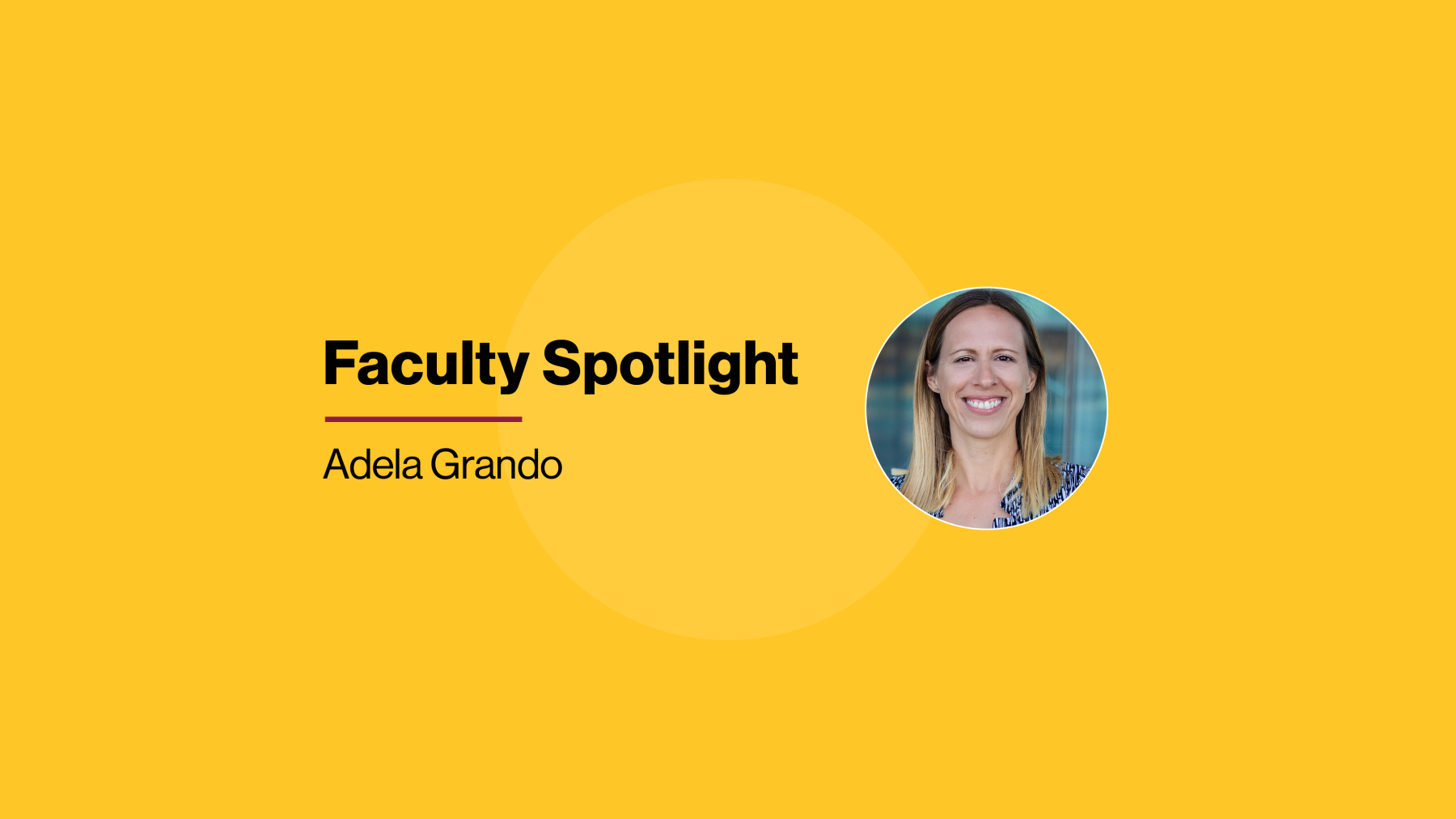
Outstanding Faculty Mentor Awards honoree strives to give voice to the voiceless
Name: Adela Grando, PhD
Introduce yourself, where are you from?
My name is Adela Grando; I am from Argentina! I am an Associate Professor of Biomedical Informatics at the College of Health Solutions (CHS). I am also the CHS Director of Research Education, mentoring faculty to improve their grantsmanship. Additionally, I am faculty for the HonorHealth Clinical Informatics Fellowship, mentoring physicians who want to specialize in informatics. I have been a faculty member at ASU for almost ten years.
Please tell us about your academic and professional background.
I completed my bachelors and masters in computer science in Argentina and received a PhD fellowship to study in Spain. Before coming to ASU, I was a postdoctoral scholar at the University of Edinburgh in Scotland and the University of California, San Diego specializing in medical informatics.
What’s something you learned during your professional or academic journey that surprised you or changed your perspective?
I trained as a computer scientist. I first heard about medical informatics during my postdoctoral training in Edinburgh and I was hooked. Knowing that I could help patients to improve their health through the application of computer science changed the direction of my professional journey.
How did you become involved in mentorship?
I am the fourth of five children. My first mentoring experience was with my youngest sister (I am three years older than her). I especially enjoyed helping with her homework, so from that early age, I realized I was passionate about teaching and mentoring. Starting my second year of college, I began mentoring other students as a teaching assistant. Since then, I have never stopped mentoring others in whatever capacity I can do it.
What are some of the approaches and methods you use in your mentoring?
As a first-generation student, a Latina woman in science, and a non-native English speaker who grew up in a developing country, I have a first-hand understanding of the academic challenges faced by college students. My goal is to be a role model for those who struggle to belong, providing the knowledge and tools to empower them to succeed and mentoring them to find their true passion and achieve their highest potential.
My mentoring style is based on five basic principles:
(1) Integrate theory and real-world knowledge through hands-on, real-life, and active learning opportunities
(2) Teach strong work ethics that include being punctual, following through on commitments, being respectful and considerate to each other, behaving professionally, and acting with integrity and honesty
(3) Thrive through collaboration by leveraging the strengths and expertise of others to solve complex health problems
(4) Create equitable, diverse, and inclusive ecosystems by selecting mentees that are women (under-represented in STEM), or from minority groups, or non-native English speakers
(5) Promote student success by helping mentees to apply for awards and opportunities; since I started mentoring ASU students in 2013, 21 have received academic awards.
How have you interacted with the Grad College? Is there an event, initiative, or funding opportunity you’re excited about?
I am excited about joining the ASU Graduate Faculty Mentor Academy; I look forward to contributing to this initiative. I am also a fan of the new Mentoring Matters series.
What organizations or individuals outside of ASU do you network with?
I create mentoring experiences that require collaborating with multiple health providers and community partners, including Mayo Clinic, HonorHealth, Contexture (Arizona and Colorado Health Information Exchange), Copa Health, and Jewish Family and Children's Services. My research projects allow mentees to conduct observations in clinical settings, recruit patients for studies, analyze electronic health record data, interact with clinicians, and develop and test interventions in clinical settings.
Congratulations on being named an Outstanding Faculty Mentor - what does this award mean to you?
It was a wonderful surprise! It is an encouragement to continue dedicating my time and energy to the success of others. My goal is for my students to thrive and become more successful than I am.
What advice do you have for students who are interested in finding a mentor or mentoring others?
Look for multiple mentors among the ASU faculty and outside the academic ecosystem. Do not be shy to ask for advice and mentorship.
Also, mentor other ASU students: you are never too young to start mentoring others. Mentoring is a rewarding experience where the mentor and mentee learn together and you will not regret it.
What are some of your long-term professional goals?
My life purpose is to give voice to the voiceless. My long-term goal is to support the academic success of ASU students, especially those from under-represented groups. I dream of creating an equitable, diverse and inclusive learning and working ecosystem where everyone thrives.
The Graduate College is dedicated to professional development and believes mentorship is a necessary foundation in academic growth and career development.
More stories from the Graduate Insider

Graduate funding deadlines for Fall

Humanities Week: The Critical Language Scholarship
